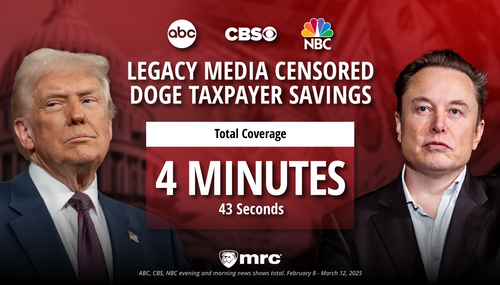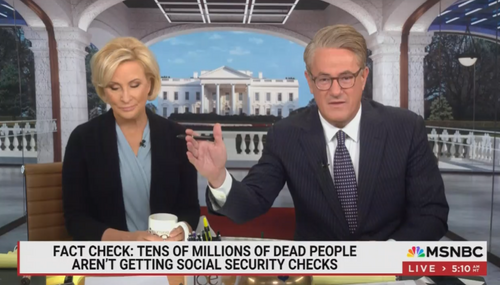On Wednesday's CBS Early Show, co-host Chris Wragge interviewed former Defense Secretary Donald Rumsfeld and questioned President Obama's Libya policy: "...on Monday, the President said it would be a mistake to send U.S. troops to push out Qadhafi, saying quote, 'We went down that road in Iraq'...taking a shot at you and President Bush....Isn't the President being a bit hypocritical?"
Even Rumsfeld was unwilling to seize on Wragge's characterization: "Oh, I'm not sure I'd use that word." However, he went on to call for greater clarity from the administration on removing Qadhafi: "...the continued ambiguity by the President and the administration about whether or not Qadhafi will ultimately be gone is harmful....as long as the people on the ground are ambiguous as to whether or not Qadhafi's going to stay or leave, more people will be killed."

Following up with Rumsfeld, Wragge worried: "So right now, if you could scale this on a scale of 1 to 10, how bad is this for the U.S.? Should Qadhafi stay in power?" Rumsfeld replied: "Oh, imagine if you were in Libya and you were part of the Qadhafi regime in the military and you were debating whether to defect and help the rebels. As long as we keep saying he may or may not leave, they're harmful. It's very harmful."
In his final question to Rumsfeld, Wragge asked: "What do you think the President should have said on Monday night that would have lended more clarity to the message of the end game here?" Rumsfeld argued: "I think at some point the United States and the coalition has to say to the people on the ground in Libya, that Qadhafi will not stay....the signal from U.S. behavior in Libya will be read in Syria and places like that, that the United States does have clarity of purpose, that the coalition does have clarity, and that these leaders who are so vicious and so harmful to our interests in the region are not – that they're mortal. That they can be gone, like Saddam can be gone."
Here is a full transcript of the March 30 interview:
7:08AM ET
CHRIS WRAGGE: In his Libya speech on Monday, the President said it would be a mistake to send U.S. troops to push out Qadhafi, saying quote, 'We went down that road in Iraq.' Joining us from Washington is someone highly qualified to discuss that, former Secretary of Defense Donald Rumsfeld, author of the recent memoir 'Known and Unknown.' Mr. Secretary, good morning.
DONALD RUMSFELD: Good morning.
WRAGGE: The President wants Qadhafi out, does not advocate regime change. Like I mentioned, on Monday night he went so far as to taking a shot at you and President Bush, saying, 'We've been down this road before.' Isn't the President being a bit hypocritical?
RUMSFELD: Oh, I'm not sure I'd use that word. I think the important thing we know is that we have U.S. military forces engaged and we have to hope that they're successful. And second, I would say is that the continued ambiguity by the President and the administration about whether or not Qadhafi will ultimately be gone is harmful. This is supposed to be a humanitarian effort. I can – there's no doubt but that as long as the people on the ground are ambiguous as to whether or not Qadhafi's going to stay or leave, more people will be killed.
And second, what's really important, of course, in that part of the world are Iran and Syria and Egypt and Saudi Arabia. And the signals that we're ambivalent about whether or not Qadhafi should go once we're in there, it seems to me that ambivalence is harmful also in Syria. Where there are riots and there are demonstrations and where you have a regime, that working with Iran, is damaging American interests in Afghanistan, it's damaging American interests in Iraq, it's very harmful, what they're doing.
[ON-SCREEN HEADLINE: Rumsfeld's View; Former Defense Secretary on Libya, Middle East Unrest]
WRAGGE: So right now, if you could scale this on a scale of 1 to 10, how bad is this for the U.S.? Should Qadhafi stay in power?
RUMSFELD: Oh, imagine if you were in Libya and you were part of the Qadhafi regime in the military and you were debating whether to defect and help the rebels. As long as we keep saying he may or may not leave, they're harmful. It's very harmful.
WRAGGE: But-
RUMSFELD: And – go ahead.
WRAGGE: And let me ask you this, about the rebels that you just talked about, in regards to arming the rebels, and the President has said, quote, yesterday, 'I won't rule it in, but I'm not ruling it out.' Rebels right now are being beaten back by Qadhafi's forces, who are continuing to fight, even though we are, you know, engaged in these air strikes. Is that what needs to be done, do these rebels need to be armed and then do they, in turn, need to be trained?
RUMSFELD: Well, you know, if your on the outside you know there's a lot you don't know about what's actually taking place. In life, there's public diplomacy, private diplomacy, there's overt action and there's covert action, and those of us on the outside don't know what's taking place. I do know that the signal being sent that the United States of America is still unclear about whether or not Qadhafi will leave or stay is harmful.
WRAGGE: What do you think the President should have said on Monday night that would have lended more clarity to the message of the end game here?
RUMSFELD: I think at some point the United States and the coalition has to say to the people on the ground in Libya, that Qadhafi will not stay. Once that happens, all the forces will start moving away from Qadhafi, they'll start moving towards the rebels. And there is at least the prospect that the signal from U.S. behavior in Libya will be read in Syria and places like that, that the United States does have clarity of purpose, that the coalition does have clarity, and that these leaders who are so vicious and so harmful to our interests in the region are not – that they're mortal. That they can be gone, like Saddam can be gone. And I think that's an important message for people who are looking for freer political systems and freer economic systems, to have that confidence that those people are not going to be there forever.
WRAGGE: Secretary Donald Rumsfeld, thank you very much for talking with us this morning. Good to speak with you.
RUMSFELD: Thank you.
— Kyle Drennen is a news analyst at the Media Research Center. You can follow him on Twitter here.




